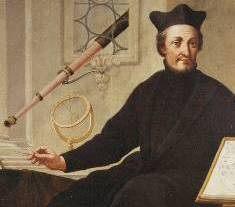Scheiner, Christoph (1575–1650)

Christoph Scheiner was a German Jesuit astronomer who co-discovered sunspots and did much to improve solar observing techniques in his time. Scheiner was born in Wald, near Mindelheim in Swabia (southwest Germany). He joined the Jesuit order in 1595, and started his studies in 1601 at Ingolstadt where he later taught mathematics from 1610 to 1616. He moved to Innsbruck in 1616, was in Rome from 1624 to 1633, and died in Niesse on 18 June 1650.
The controversy between Scheiner and Galileo over priority in the discovery of sunspots was an important factor (though not the only one) responsible for the degradation in the relationship between Galileo and Roman members the Jesuit Order. By his own account Scheiner began observing sunspots in March or April 1611, together with his then assistant J. B. Cysat. The first published account of his observations are his Tres epistolae de maculis solaribus (Three letters on Solar Spots), dated 11 November 1611, addressed to Augsburg magistrate Mark Wesler (1558–1614) and published in Augsburg in January 1612. These were followed by three more letters in September 1612, again published via Wesler. Scheiner was required by his ecclesiastic superiors to write under the pseudonym Appelles, to avoid possible embarrassment to the Jesuit order in the event that his findings were to prove spurious.
Scheiner's original opinion was that sunspots were small planets closely orbiting the Sun, a position convincingly refuted by Galileo in his own 1632 Letters on Solar Spots. Unlike Galileo, Scheiner pursued sunspot observations on a continuous basis for more than 15 years. In the course of doing so he devised techniques that greatly improved the accuracy of observed sunspot positions, and designed specialized solar observing instruments. Results of his observations were published in 1630 in his Rosa Ursina, a book four years in the making that opened with biting attack on Galileo, to which the latter was to reciprocate in his Dialogues.


